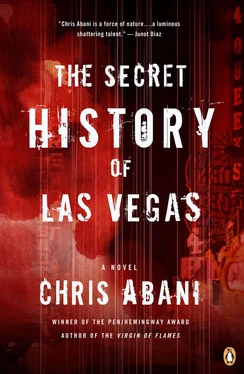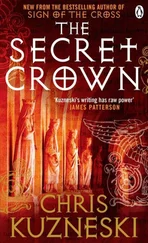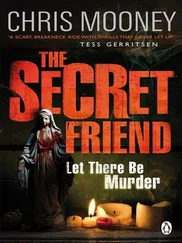Why are you so fucking quiet, Salazar asked. You’re freaking me out.
They were at this point rolling down Main Street, speed cut to a crawl, looking out for signs of life. Even though most of the buildings were boarded up, some light came from the bar, the general store, and the pink building with the neon ANGEL’S LADIES sign. And then there was that music, the guitar and voice that seemed to be everywhere at once.
At least they’ve got the right businesses open, Sunil said. Food, liquor, and sex.
So?
So they can’t be all that weird, Sunil said.
Amen to that, Salazar said, relaxing for the first time since they’d turned off the freeway.
They parked just a few doors away from the bar, by an abandoned diner. Sunil peered through the window. Eerily there were still place settings and coffee in the pot on the counter. It looked open, except for the film of dust over everything and the big rat on the counter next to the coffeepot cleaning its paws.
Next door was the pink-painted bordello with the hissing neon sign, and Sunil wondered who Angel was, and why there was a bright-blue neon sign in a ghost town, five miles off a freeway. It wasn’t like anyone new would wander by and see it, and everyone who knew about it didn’t need the sign.
The bar was a low-slung building probably unchanged from when it was first built around the beginning of the last century. ROSE WALTER’S, a sign above it said. Sunil pulled the white door open and walked in, Salazar behind him. The place was empty, aside from the barman, who was older, with long unwashed hair and a tie-dyed rainbow shirt.
Welcome, name is Bob, he said. What can I fetch you gentlemen?
Sunil and Salazar settled at the bar.
Bob, you’re shitting me, Salazar said.
You wouldn’t happen to have any single-malt whiskey, would you, Sunil asked.
Sure do, Bob said, reaching under the counter and pulling out a bottle. He placed it before Sunil, fetched a rag, and wiped it clean of dust.
Sunil inspected it; good color, good odor. Fine sample, he said.
Bob laughed happily and poured generous amounts into three shot glasses. He toasted them and downed the whiskey, eyes watering. Sunil and Salazar drank it down too.
Really good, Sunil said, feeling the familiar warmth spread through him.
First one’s on the house, gentlemen, Bob said.
Where the fuck is everyone, Salazar asked.
They’ll be here. Some fly in from Vegas every night, land in the old airstrip where the crash is. Others come by bus and this place usually has about three thousand people by midnight, when the carnival starts. It’s been good for us, that carnival.
What’s the carnival called, Sunil asked.
Carnival of Lost Souls, Bob said.
Where can we find it, Salazar asked.
Just turn right by the whorehouse and follow the yellow brick road.
You’re shitting me, Salazar said.
Ain’t shitting you.
Fuck, Salazar said, getting up.
Sunil settled the tab.
The yellow brick road had no bricks, and it wasn’t particularly yellow, either. It was just a cracked and pitted tar road with orange paint splattered carelessly over it in a thin film, as if someone had driven up and down holding a paint can from an open window, splashing the road. Perhaps that was what made it extraordinary, because there was no denying that it was. That, and also, perhaps, the sudden blaze of a patch of California poppies to the side, and the weeds that flung back from the road into the houses, their heads bent from a gentle breeze. At the end of the road was a bristlecone pine laden with decaying shoes, hundreds of them strung up like dark lanterns.
Under the tree stood a woman.
She was at least six-three, with very short hair, almost a buzz cut, and a body that was cut and rippling with muscle. She was holding a clipboard in one hand, and a walkie-talkie in the other.
Salazar pulled up under the tree and got out. Sunil followed.
You can’t park here, Fred said, her voice deep and husky. Please follow the signs to the visitors’ lot.
You must be Fred, Salazar said.
And you are?
Detective Salazar, and this is Dr. Singh.
Well, all our permits are in order and I don’t recall calling the police.
And yet we are here to see you, Salazar said.
Has something happened?
Is there anywhere we can talk privately, Salazar asked.
Has something happened, Fred repeated.
We came a long way, Sunil chimed in.
Everyone who comes here does, Fred said, unimpressed.
We can talk here or back in Las Vegas, Salazar said.
Fred laughed. Does that ever work, Detective? I have to set up tonight’s show. You’re welcome to stay for it. Box office opens at nine. With that, Fred went back to giving instructions to someone over the walkie-talkie.
Sunil stepped forward. I’m sorry if we got off on the wrong foot, he said. We are here to talk to you about two of my patients. I believe they were performers in your carnival.
Fred shoved the walkie-talkie into her back pocket, where the bulge drew Salazar’s eyes. She cut him a dirty look and then brought impatient eyes to bear on Sunil.
He suddenly felt breathless. Fire and Water, he said, more in a croak than anything.
King Kong, Salazar added.
King Kongo , she said to Salazar, then turned to Sunil: You have the twins. Thank God. I was worried about them. I haven’t seen or heard from them in over two weeks. Yes, yes, by all means, let’s talk.
With that she turned and trudged off across a small patch of grass, headed toward a blue Victorian wood house, alone at the edge of a rise. It was so blue; the color was like a shout in the gathering darkness.
She led them up some steps, through the front door, crossing a living room in a soft yellow, and out onto a back porch that was all red. Four Adirondack chairs sat there looking out over a sheer drop of about fifty feet. Below them, spread out across the floor of what was clearly an abandoned quarry, lit up like a scene from a fairy tale, was a carnival. But instead of the usual carney organ music, a young man sat in a wheelchair in the middle of everything, lit by a giant spotlight, playing a guitar and singing into an old-school microphone.
Welcome to the Carnival of Lost Souls, Fred said.
Eskia stared at the Kentridge on Sunil’s wall for a very long time. As he examined it from different angles, he smoked several cigarettes, taking pleasure in knowing that the smell would drive Sunil crazy. Eskia liked Kentridge, also Pieter Hugo. Their work was not invested in obscuring or blotting out the uncomfortable truths about apartheid.
He’d half expected to find Asia hiding out here, and wondered where she was. Normally he would be tracking her down; he hated to leave loose ends. But this was no normal case. He fully intended to kill Sunil on Monday and by Tuesday evening to be home in Johannesburg. Since he had no intentions of returning to the United States in the foreseeable future, she posed no real threat to him. He wouldn’t admit it, not even to himself really, but he was glad not to kill her. Asia had something that got under your skin very quickly, and not just because she was beautiful and could do things sexually he never knew were possible. There was a vulnerability to her that brought out the protective instinct in men. In a way he understood Sunil’s fascination with her; too bad it felt like such a fucking cliché.
He wandered into the kitchen to open the fridge and poked around. He popped the top on a beer and drank deeply, then set it down on the counter and checked the freezer and every other inch of the fridge for hiding places, shaking every can, every box, opening the yogurt and running his fingers inside, even pulling the shelving panel away from the door frame. Nothing.
Читать дальше












